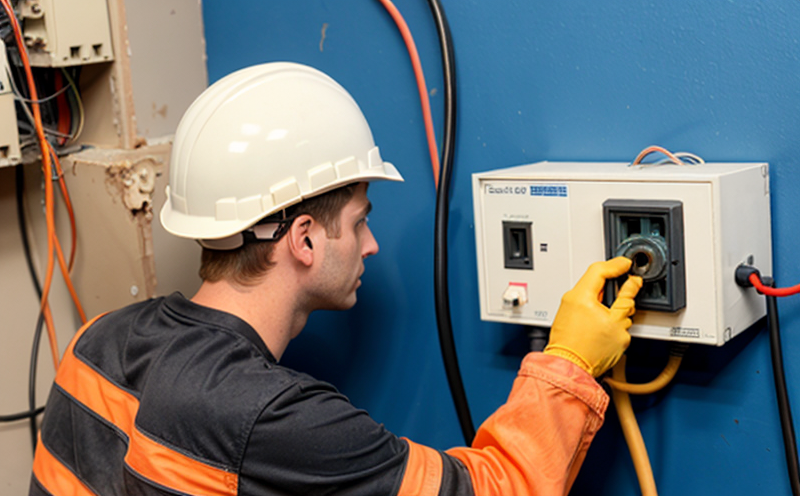IEC 60601-1 Protective Isolation Barrier Testing
The IEC 60601-1 standard is a foundational document that provides essential guidelines and requirements for the safety of medical electrical equipment. The Protective Isolation Barrier (PIB) testing, specifically addressed in clause 17, focuses on ensuring that the medical device can safely isolate high-voltage circuits from patient contact areas to prevent unintentional electric shock.
The PIB is a critical feature of many medical devices. This barrier separates the high-voltage power supply from low-voltage control and safety systems used for patient care. The integrity of this barrier is essential to ensure that any fault in the high-voltage circuit does not compromise the patient's safety by reaching the low-voltage side.
The protective isolation barrier test aims to verify that the insulation between the two circuits meets specified performance criteria, particularly under conditions where a fault may occur. The test involves applying an AC voltage across the barrier and measuring the current flow through it. If the measured current exceeds certain limits, the device fails the test, indicating potential vulnerabilities in its design or manufacturing.
Compliance with this clause is crucial for medical devices that operate at high voltages but are intended to interact directly with patients. It ensures that even if there is a failure in one part of the circuit, it does not jeopardize the patient's safety by creating an unintended electrical path between the two circuits.
The test procedure involves several steps:
- Preparation: Ensure all relevant documentation and equipment are available.
- Setup: Connect the testing setup according to IEC 60601-1 specifications, including the voltage source and measurement instrumentation.
- Testing: Apply the specified AC voltage and monitor current flow across the isolation barrier.
- Evaluation: Compare measured results against the acceptable limits outlined in the standard.
The test is critical for ensuring that medical devices meet stringent safety requirements, especially those used in intensive care units or other high-risk environments where patient safety must be paramount. Compliance with IEC 60601-1 helps protect patients and healthcare providers from potential electrical hazards.
Failure to comply with these standards can lead to legal issues, product recalls, and damage to the manufacturer's reputation. Therefore, it is essential for manufacturers to conduct thorough testing before marketing their products globally.
Eurolab Advantages
At Eurolab, we pride ourselves on offering comprehensive services that cater to the diverse needs of our clients in the medical device industry. Our expertise in IEC 60601-1 Protective Isolation Barrier Testing is just one example of how we provide high-quality and reliable testing solutions.
Our team of experienced professionals ensures that every test conducted meets international standards, including those specified by IEC 60601-1. We employ state-of-the-art equipment to ensure accurate measurements and reproducible results. This precision is crucial for demonstrating compliance with the latest regulatory requirements.
We understand that time-to-market is critical in today’s competitive environment. That's why we offer fast turnaround times without compromising on quality. Our efficient processes allow us to deliver test reports promptly, helping you stay ahead of schedule and avoid delays in product launches.
In addition to our technical expertise, Eurolab also offers unparalleled customer support. From initial consultation to final report delivery, our dedicated team is always available to assist you throughout the testing process. Our commitment to excellence ensures that you receive not only accurate test results but also valuable insights into how your products perform against regulatory expectations.
Choosing Eurolab for your IEC 60601-1 Protective Isolation Barrier Testing needs means partnering with a reliable and experienced laboratory. We are committed to helping you achieve compliance efficiently and effectively, ensuring that your medical devices meet all necessary safety standards.
Quality and Reliability Assurance
- Accurate Measurements: Our lab utilizes cutting-edge technology to ensure precise measurement of voltages and currents during the testing process. This accuracy is vital for reliable results that meet international standards.
- Reproducibility: By adhering strictly to IEC 60601-1 specifications, we guarantee consistent test outcomes every time. This reproducibility builds trust in our quality control processes.
- Detailed Reporting: Comprehensive reports are provided post-testing, detailing all aspects of the testing procedure and results. These detailed reports help you understand any areas needing improvement or further investigation.
The reliability of our testing services is underpinned by our adherence to rigorous quality management systems. We regularly undergo audits to ensure compliance with ISO/IEC 17025 standards, which are internationally recognized as benchmarks for laboratory excellence. Our commitment to maintaining these high standards ensures that the results we provide are credible and actionable.
By choosing Eurolab for your IEC 60601-1 Protective Isolation Barrier Testing, you can be confident in the reliability of our services. We stand by our work, providing not just compliance but also a deep understanding of how your products meet or exceed regulatory expectations.
Competitive Advantage and Market Impact
Compliance with IEC 60601-1 standards is increasingly becoming a differentiating factor in the medical device market. By ensuring that your products pass stringent safety tests, you demonstrate a commitment to patient safety and regulatory compliance.
Passing this test can significantly enhance your product's reputation among healthcare professionals and patients alike. It shows that your company prioritizes quality control and adheres to international best practices. This reputation can translate into increased market share as hospitals and clinics around the world seek out trusted brands for their equipment needs.
In addition, successful completion of these tests opens up access to global markets where stringent safety regulations are enforced. Many countries require medical devices to comply with IEC 60601-1 before they can be sold locally or exported. By ensuring compliance early in the development process, you avoid costly delays and ensure smooth entry into target markets.
Moreover, continuous adherence to such rigorous testing standards fosters innovation within your organization. It encourages R&D teams to push boundaries while maintaining a focus on safety and reliability—elements that are crucial for long-term success in this highly regulated industry.





